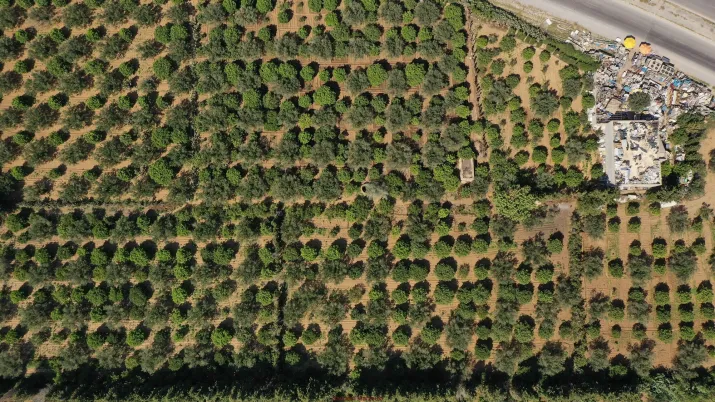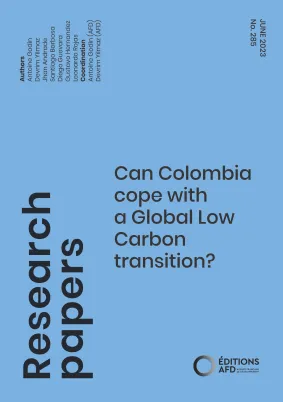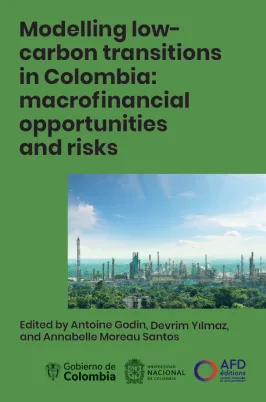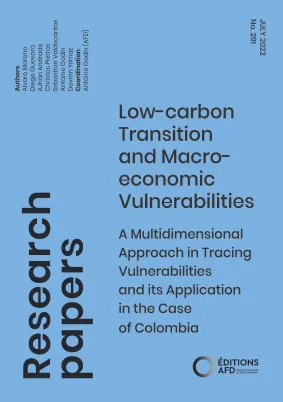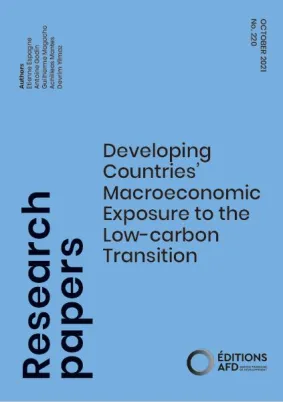Share the page
GEMMES Colombia: understanding macroeconomic vulnerabilities and opportunities related to low carbon transition

-
Project start date
-
2018Status
Completed
-
Project end date
-
2025
-
AFD financing amount
-
200 000
-
Country and region
-
Partners
-
Research program
Colombia has demonstrated its commitment to climate issues through its commitment to implementing its nationally determined contribution (NDC) under the Paris Agreement. Developing an ecologically and economically sustainable development trajectory is a significant challenge, which the GEMMES Colombia project supports through sound methodology and policy-based dialogue.
Context
Highly exposed to the effects of climate change and to the degradation of natural resources, Colombia is strengthening its climate policy, considering a green growth strategy, particularly since the 2014-2018 National Development Plan. Nevertheless, the country's dependence on raw material exports and its strong integration into international financial markets generate monetary, financial and commercial vulnerabilities.
AFD is supporting Colombia in its efforts to tackle climate change through the GEMMES Colombia project, which is part of the third climate policy loan since 2018. The GEMMES programme, by integrating the impact of climate change into its forecasts, is developing a general theoretical model on the one hand, and national models applied to concrete cases and adapted to the characteristics of each country on the other, including the GEMMES Colombia model.
Objectives
The GEMMES Colombia project, which is fully in line with AFD's commitment to strong sustainability, aims to :
- Highlight potential fragilities in the Colombian economy through a better understanding of the interactions between fiscal, monetary and trade policies and the country's NDC objectives;
- Identify the opportunities generated by the energy transition in Colombia: structural changes and financing methods under the best possible conditions;
- Quantifying the macroeconomic impact of NDC-related investments, particularly in the financial and tax sectors;
- Promoting public policy dialogue on Colombia's energy transition:
- Providing a decision-making tool for decision-makers on climate policies, with a view to limiting the consequences identified without compromising the implementation of Colombia's NDC objectives;
- By promoting the appropriation and sustainability of the GEMMES modelling tool within the partner institutions.
Method
In addition to its specific transdisciplinary approach, which makes this project one of the few to integrate the notion of strong sustainability, the originality of GEMMES lies in its consideration of macro-financial imbalances and the impact of the low-carbon transition on all elements of the balance of payments.
Moreover, GEMMES Colombia is part of a partnership initiative that is organised around two phases:
- The first phase is based on the development of the model and the macroeconomic analysis of the Colombian NDC trajectory, in partnership with the National Planning Department (DNP) and the Ministry of Finance (MHCP) supported by AFD's modelling teams.
- The second is intended to ensure the sustainability of the project after the end of the support, with the analysis by the National University of Bogota (UNAL) of the interactions between trade, fiscal and monetary policies and the NDC trajectory, as well as the training of students in sustainable development through the Catedra course as well as in the GEMMES methodological approach.
Results
The GEMMES Colombia model, enriched by academic expertise and integrated into decision-making processes through Colombian ministries, has become a key tool for public policy dialogue on the energy transition:
- At the request of the Colombian authorities, GEMMES was added to the MHCP’s macroeconomic models in 2023 and was coupled with the Energyscope energy model, a tool for energy assessment and planning. The model’s adoption continued in 2024 with an executive training session on its use provided to MHCP officials.
- These exchanges are ongoing through the GEMMES Strategic Committee, composed of the Ministry of Finance and Public Credit (MHCP), the National Planning Department (DNP), the Ministry of Mines and Energy (MME), and the Banco de la República.
FIND OUT MORE
Furthermore, the research work led to the publication of a collective volume launched in June 2024, presenting the scientific findings and policy recommendations derived from the project: Modelling Low-Carbon Transitions in Colombia: Macrofinancial Opportunities and Risks
This work also gave rise to a new initiative: the creation of PowerShift, a strategy game designed to support multi-stakeholder dialogue around Colombia’s NDC.
Watch the replay of the GEMMES Colombia book launch (in Spanish)
The first results of the project had been presented at the virtual congress "Conexión DNP: transfiriendo conocimiento para innovar" on 2 and 3 December 2021. The project partners expressed their satisfaction, with the MHCP showing a particular interest in modelling after a year of remote work due to the Covid-19 pandemic.
In March 2022, a university course on sustainable development (Catedra), partly based on the results of the GEMMES Colombia project, was launched at UNAL. As a continuation of this initiative, a second course on the modelling of ecological transitions in the Global South was given in 2023.
Research findings
The GEMMES Colombia model, by developing scenarios on fossil fuel exports and alternative policies for the 2023-2050 period, as well as financing scenarios of the NDC trajectory, contributes to informing decision-makers in their political strategy to fight global warming. The model also allowed the National Planning Department (DNP) to analyze the consequences of economic shocks such as the loss of the country’s investment quality, the reduction of coal exports or the bankruptcy of Evergrande in China.
The conclusion is clear: a diversification of the production structure and a transformation of public finances are essential if Colombia is to meet the challenges of a global low-carbon transition and ensure its own energy transition. The GEMMES model highlights the importance of using a combination of private investment and public green bonds to finance Colombia's climate ambition.
Download the publications related to GEMMES Colombia
Contact
-
Antoine GODIN
Economist - Modeler



